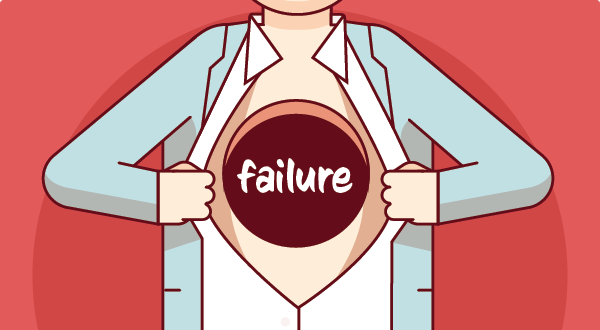Wil Schroter

I've failed numerous times and watched countless other Founders do the same. We kept ourselves awake nonstop worrying about the outcome of our failures. We took years off of our life and put ourselves in horrible places mentally and physically.
And you know what we learned in the end? It generally didn't matter.
That's right, our "fear of failure" was always 100x worse than how the failure itself played out. And so we took desperate measures to avoid failure, like clearing the last of our savings, running up debt, and going yet another year without pay. At some point, we became far more intent on "not failing" than succeeding.
What we need is a method for dissecting failure into actionable bits.
Failure needs to be Unpacked
If we think about failure as this big, amorphous dark cloud that ruins us forever, then failure seems like the worst thing we can imagine in our careers. But there's a ton of danger to leaving our fears in that cloud. What we need to do is unpack those fears into actual detailed definitions of what might happen.
The best way to do this is to assess every fear using "Impact" ("What will be the actual impact?") and "Timeline" ("How long will that impact matter?").
For example, we're all terrified that we'll lose our investors' money, which obviously sucks. But now let's apply the Impact and Timeline of that loss. The Impact will be that the investor will lose money, and our relationship will suffer some damage. We can feel pretty confident about that. The timeline will involve about 30-60 minutes of tough conversations ("It's over") and then the investor will go back to the dozens of other companies they are investing in. In some cases, it'll be out of their minds by tomorrow morning.
That's a measure of the actual outcome — and it's actually not that bad. But that's not how we think about it, and that's where we get ourselves into trouble.
We View Failure as Permanent
In our Founder brains, we don't think of failure as a momentary issue. We think of it as this lifelong brand of incompetence that we will wear on our foreheads like the startup version of the "Scarlet Letter". But guess what? No one gives a shit but us. Elizabeth Holmes had one of the most epic failures in recent history, so much so that they are making movies about it.
But do any of us sit around daily thinking about it? Not at all. And let's face it, we're not shutting down Theranos here.
What we fail to realize when we think about failure is that the outcomes aren't nearly as painful as we envision them to be and even the most painful parts are quickly forgotten about. Our failures become a moment in time, but more so, a moment that's meaningful to us, personally, not to everyone else.
On top of that, our lives aren't singularly defined by this one moment. I can barely recall the failures I had 10 years ago, although at the time they seemed like the worst thing that could ever happen. What we "lose" when we are in the moment is perspective. We forget that time is actually working in our favor, and time, as it happens, will move past everything.
We always make "Bad" to be way Worse
When we're in the middle of an epic shutdown, the last thing on our minds is "It's not that bad". Breaking a leg may not be a mortal injury, but it still hurts like hell. Our problem as Founders is that we often glamorize how bad things are going to be in our minds. We don't simply say "OK, I have to get another job now," we say "OH MY GOD! I'm going to be ruined!" And if we take that level of emotion to address the problem, we really are screwed.
But that's not how these things really play out. What we need to do, going back to the "Impact" portion of our problem, is to unpack the outcome into the most specific results. How much we will we owe? What's the monthly debt service? How long will it likely take to find another job? What will be "lost" for sure, and what will be momentary? This goes the same for everyone else we will affect.
When we break things down, they become less scary. We need to transform "I'll be ruined!" with "I'll be working a different job within 3 months." The actual costs are never what our minds perceive.
In Case You Missed It
The Emotional Cost of Being a Founder. When we talk about building startups, we talk about lots of costs: Staffing costs, the cost of capital, cost per acquisition, and opportunity cost. But we never talk about the biggest cost – the emotional cost.
3 Benefits of Emotional Intelligence for Today’s Business Leaders. Leaders who can recognize their own emotions in relation to how they affect their behavior are better able to control their own impulses and handle change.
Why Do I Feel So Alone? No one ever tells you in the “Starting a Company” brochure that the journey will not only include crippling anxiety, drowning in personal debt, and endless challenges — but also a healthy dose of personal loneliness.
Find this article helpful?
This is just a small sample! Register to unlock our in-depth courses, hundreds of video courses, and a library of playbooks and articles to grow your startup fast. Let us Let us show you!
Submission confirms agreement to our Terms of Service and Privacy Policy.
Already a member? Login
No comments yet.
Start a Membership to join the discussion.
Already a member? Login